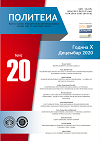Sociocultural Aspects of Political Activism: A New Model Proposal
Sociocultural Aspects of Political Activism: A New Model Proposal
Author(s): Ana Nešić Tomašević, Lazar ŽoltSubject(s): Governance, Political behavior, Politics and society, Crowd Psychology: Mass phenomena and political interactions, Sociology of Politics
Published by: Fakultet političkih nauka Univerziteta u Banjoj Luci
Keywords: political activism; value orientations; sociocultural model; political party members;
Summary/Abstract: This paper analyses the correlation between political activism, political participation, and certain value orientations, as crucial parts of modern governance in society today. A sample of the survey were members of the ruling and opposition parties, who were structured by age, place of residence, political affiliation, and role in local parliaments in six cities in Serbia. Results show a mixture of pre-modern (traditional), modern, and postmodern values, with traditional values still being viable, which could be one of the factors that significantly reduces the process of social transition. Socio-demographic variables and value orientations (autocratic-democratic, traditional-modern), along with the aspects of political culture, determine political behaviour to a large extent. The model of political activism, on which the study is based, is the model of socio-economic status. The results of the research suggest that a new, enhanced model should be proposed, entitled socio-cultural model of political activism.
Journal: Politeia - Naučni časopis Fakulteta političkih nauka u Banjoj Luci za društvena pitanja
- Issue Year: 11/2021
- Issue No: 22
- Page Range: 37-54
- Page Count: 18
- Language: English

